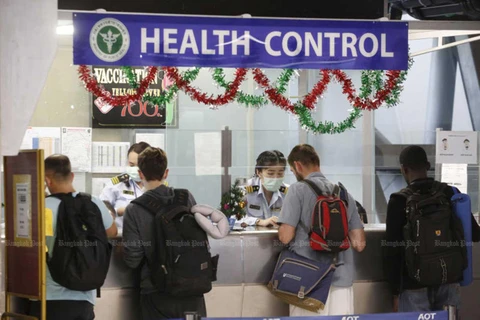Bangkok (VNA) – Thailand’s Department of National Parks, Wildlife and Plant Conservation (DNP) plans to screen cave bats amid health concerns that the creatures might be linked to the outbreak of the coronavirus in China.
Bangkok Post newspaper quoted the DNP Deputy Director-General Chongklai Voraphongston as saying that the department’s scientists will monitor all caves with bats in national parks.
The study will be joined by well-known Thai researcher, Supaporn Watcharaprueksadee, Deputy-Director at the Centre for Emerging Infectious Diseases of Thailand of Chulalongkorn University.
Earlier, a group of experts detected a coronavirus strain in Horseshoe bats in Thailand. Supaporn and scientists plan to research 23 new virus strains found in national parks across the country.
Chongklai, however, played down the health risks associated with bats in caves, saying that tourists come just to watch the bats, not consume them for food, and that minimises the risk.
The DNP will also keep an eye on the health of Chinese tourists who visit the caves, he added.
Bats are classified as protected wildlife under Thai law and there is a ban on hunting them. Yet, bats have been illegally exported to China to be eaten as delicacies and their dung has also been used locally to make fertiliser.
Thailand’s central province of Ratchaburi has the highest number of bats with millions inhabiting caves.
Scientists suspect that the Wuhan coronavirus spread from bats to snakes and, eventually, to humans. Outbreaks of Severe Acute Respiratory Syndrome (SARS) and Middle East Respiratory Syndrome (MERS) in the past were also thought to have been spread by bats./.
Bangkok Post newspaper quoted the DNP Deputy Director-General Chongklai Voraphongston as saying that the department’s scientists will monitor all caves with bats in national parks.
The study will be joined by well-known Thai researcher, Supaporn Watcharaprueksadee, Deputy-Director at the Centre for Emerging Infectious Diseases of Thailand of Chulalongkorn University.
Earlier, a group of experts detected a coronavirus strain in Horseshoe bats in Thailand. Supaporn and scientists plan to research 23 new virus strains found in national parks across the country.
Chongklai, however, played down the health risks associated with bats in caves, saying that tourists come just to watch the bats, not consume them for food, and that minimises the risk.
The DNP will also keep an eye on the health of Chinese tourists who visit the caves, he added.
Bats are classified as protected wildlife under Thai law and there is a ban on hunting them. Yet, bats have been illegally exported to China to be eaten as delicacies and their dung has also been used locally to make fertiliser.
Thailand’s central province of Ratchaburi has the highest number of bats with millions inhabiting caves.
Scientists suspect that the Wuhan coronavirus spread from bats to snakes and, eventually, to humans. Outbreaks of Severe Acute Respiratory Syndrome (SARS) and Middle East Respiratory Syndrome (MERS) in the past were also thought to have been spread by bats./.
VNA

























